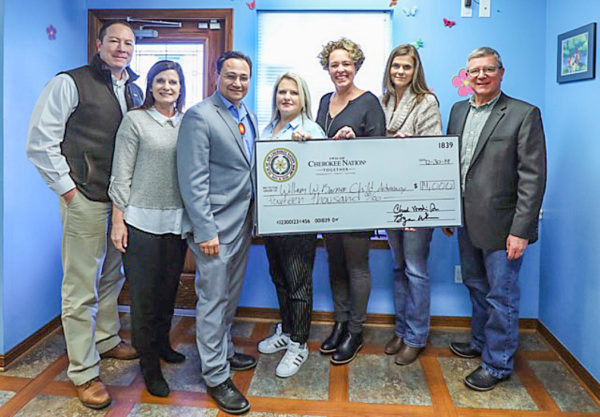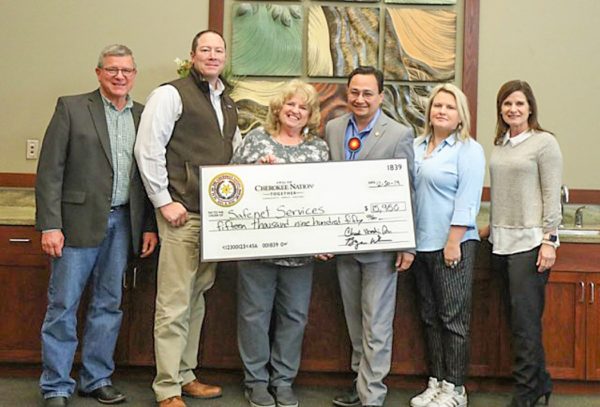
- Details
- By Native News Online Staff
CLAREMORE, Okla. — Cherokee Nation recently donated nearly $30,000 to domestic violence and child abuse advocacy programs serving communities in the Rogers, Nowata, Mayes and Craig County areas of Northeast Oklahoma.
The tribe contributed $14,000 to the William W. Barnes Children’s Advocacy Center and nearly $16,000 to Safenet Services when Principal Chief Chuck Hoskin Jr., First Lady January Hoskin, Deputy Chief Bryan Warner, and Tribal Councilors Keith Austin and Janees Taylor visited the groups on Monday, Dec. 30.
“The Cherokee Nation is always proud to support and contribute to organizations that are making investments in protecting the physical and mental health of our tribal citizens,” said Principal Chief Chuck Hoskin Jr. “The strides both of these organizations are making to ensure families of domestic violence and child abuse are getting the help they need and deserve is something to commend.”
Contributions to the agencies were provided through the tribe’s annual charitable contributions funds.
 Safenet Services: (L to R) Cherokee Nation District 14 Tribal Councilor Keith Austin, Cherokee Nation Deputy Principal Chief Bryan Warner, Safenet Services Executive Director Donna Grabow, Cherokee Nation Principal Chief Chuck Hoskin Jr., Cherokee Nation First Lady January Hoskin, District 15 Tribal Councilor Janees Taylor.
Safenet Services: (L to R) Cherokee Nation District 14 Tribal Councilor Keith Austin, Cherokee Nation Deputy Principal Chief Bryan Warner, Safenet Services Executive Director Donna Grabow, Cherokee Nation Principal Chief Chuck Hoskin Jr., Cherokee Nation First Lady January Hoskin, District 15 Tribal Councilor Janees Taylor.
“We joined together to deliver contributions to Safenet and the William W. Barnes Child Advocacy Center,” said District 14 Tribal Councilor Keith Austin, of Claremore. “Both of these amazing organizations are great partners with the Cherokee Nation. I am so grateful for the good work they do to help our women and children find a way out of crisis.”
The William W. Barnes Children’s Advocacy Center, which provides assessment, treatment and education to help reduce trauma to child abuse victims, will use the money to assist with transportation efforts, ensuring children are able to make forensic interviews and therapy appointments at the facility.
“We are so appreciative of the ongoing support from Cherokee Nation,” said Holly Webb, executive director of the William W. Barnes Children’s Advocacy Center. “Because of this support we are able to provide much-needed services to children who disclose abuse. We are able to provide them with help, hope and healing.”
As a domestic violence shelter and support center, Safenet Services will use its contributions to purchase necessities for victims staying at the shelter, such as clothing.
“We are really grateful for the help and support of the Cherokee Nation. By having these funds we are able to keep helping people,” said Donna Grabow, executive director of Safenet Services. “We want victims of domestic violence to be able to sustain themselves after leaving a situation, so if they get a job and need scrubs or shoes for work we can get that for them.”
Chief Hoskin, Deputy Chief Warner and Tribal Councilors Austin and Taylor also delivered a $1,500 donation to Share the Spirit in Rogers County, which makes food baskets for families during the holidays; a $2,500 donation to Claremore Public Schools Foundation to purchase science equipment and fund creative outlets for students; and a $1,000 donation to Boy Scout Troop 828 for uniform needs.
More Stories Like This
Native News Weekly (August 25, 2024): D.C. BriefsNavajo Nation Mourns the Passing of Former Vice President Rex Lee Jim
Deb Haaland Earns Endorsement From Communications Workers of America Local 7076
University Soccer Standout Leads by Example
Two Native Americans Named to Democratic Congressional Campaign Committee's“Red to Blue” Program
Help us defend tribal sovereignty.
At Native News Online, our mission is rooted in telling the stories that strengthen sovereignty and uplift Indigenous voices — not just at year’s end, but every single day.
Because of your generosity last year, we were able to keep our reporters on the ground in tribal communities, at national gatherings and in the halls of Congress — covering the issues that matter most to Indian Country: sovereignty, culture, education, health and economic opportunity.
That support sustained us through a tough year in 2025. Now, as we look to the year ahead, we need your help right now to ensure warrior journalism remains strong — reporting that defends tribal sovereignty, amplifies Native truth, and holds power accountable.
 The stakes couldn't be higher. Your support keeps Native voices heard, Native stories told and Native sovereignty defended.
The stakes couldn't be higher. Your support keeps Native voices heard, Native stories told and Native sovereignty defended.
Stand with Warrior Journalism today.
Levi Rickert (Potawatomi), Editor & Publisher

